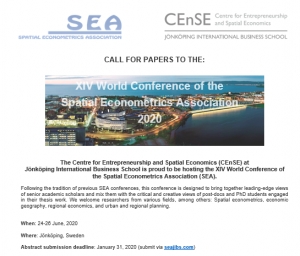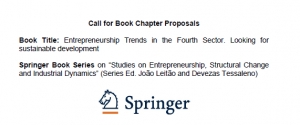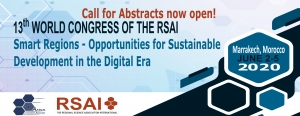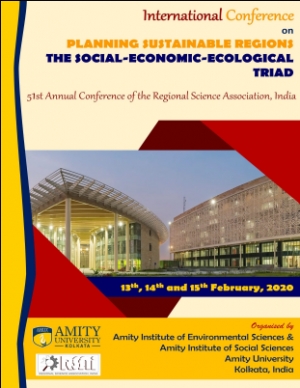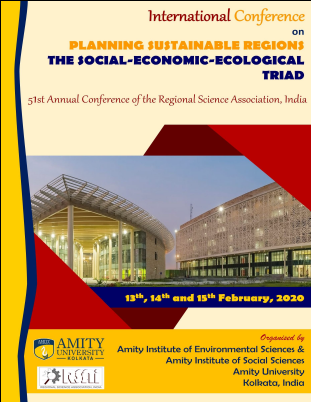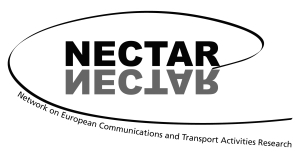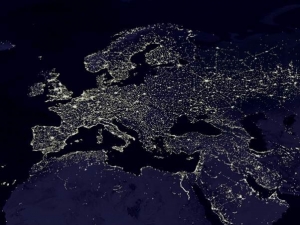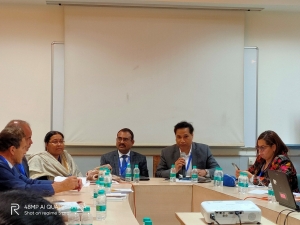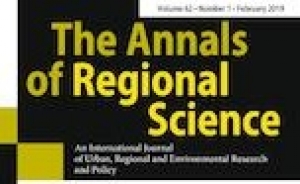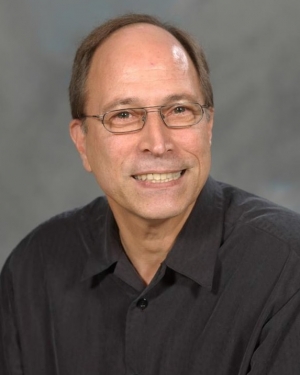Archives
Elisabete Martins
Call for papers SEA 2020
CALL FOR PAPERS TO THE:
XIV World Conference of the Spatial Econometrics Association 2020
The Centre for Entrepreneurship and Spatial Economics (CEnSE) at Jönköping International Business School is proud to be hosting the XIV World Conference of the Spatial Econometrics Association (SEA).
Following the tradition of previous SEA conferences, this conference is designed to bring together leading-edge views of senior academic scholars and mix them with the critical and creative views of post-docs and PhD students engaged in their thesis work. We welcome researchers from various fields, among others: Spatial econometrics, economic geography, regional economics, and urban and regional planning.
When: 24-26 June, 2020
Where: Jönköping, Sweden
Abstract submission deadline: January 31, 2020 (submit via seajibs.com)
Keynote speakers (additional keynotes will be announced shortly):
Xiaodong Liu, University of Colorado Boulder
Andrés Rodríguez-Pose, London School of Economics
Publications: Papers presented at this conference will be considered for publication in a special issue in the Journal of Spatial Econometrics.
Jean Paelinck Prize for Young Researchers: The prize is established to recognize and honour the outstanding career and contributions of Professor Jean Paelinck, an internationally recognized spatial econometrician of outstanding merit, who is viewed as one of the founders of the field of spatial econometrics. The Jean Paelinck Prize for Young Researchers aims to recognize the research of junior scientists in Spatial Econometrics through paper presentation and in-depth discussion. Upon acceptance, competing papers will be presented in the Jean Paelinck Sessions, where the young researchers will be given extra time for presentation and receiving feedback. Every paper will be assigned to a discussant, and the sessions will be chaired by senior scientists. The winner will receive 300 Euros. All accepted papers will benefit from a reduced registration fee to the conference.
Sceintific committee:
Giuseppe Arbia, Catholic University of the Sacred Heart
Anil Bera, University of Illinois
Roger Bivand, Norwegian School of Economics
Jean Paul Elhorst, University of Groningen
Bernard Fingleton, University of Cambridge
Lung-Fei Lee University, Ohio State University
Julie Le Gallo, Agrosup Dijon, University Bourgogne Franche-Comté
Gianfranco Piras, Catholic University of America
Yang Zhenlin, Singapore Management University
Jönköping is conveniently located between Stockholm, Gothenburg, and Malmö/Copenhagen. The city is beautifully situated along the southern shore of lake Vättern. With its international university and 140,000 inhabitants, Jönköping is full of life all year round. The interest in food is great in the city where you will find a variety of restaurants and cafés. For nature lovers and botanists, the region is a paradise with nature reserves, hiking trails, lovely views and one of Sweden’s largest oak forests
The overall mission of CEnSE is to organize, support, and carry out innovative, high-quality, basic, applied as well as policy relevant research on entrepreneurship and spatial economics. For more information about CEnSE, please visit our website: center.hj.se/cense
More information about the conference, Jönköping, CEnSE, the Journal of Spatial Econometrics, Jean Paelinck Prize for Young Researchers etc. can be found on: seajibs.com
WE HOPE TO SEE YOU IN JÖNKÖPING!
Professor Johan Klaesson (Director of CEnSE)
Associate Professor Mikaela Backman (Co-director of CEnSE)
Assistant Professor Sofia Wixe (Co-director of CEnSE)
Sofie Grahnat (Administrator of CEnSE)
Call for Book Chapter Proposals - Entrepreneurship Trends in the Fourth Sector. Looking for sustainable development
Call for Book Chapter Proposals
Book Title: Entrepreneurship Trends in the Fourth Sector. Looking for sustainable development
Springer Book Series on “Studies on Entrepreneurship, Structural Change and Industrial Dynamics” (Series Ed. João Leitão and Devezas Tessaleno)
Synopsis:
Sustainable entrepreneurship is not an option anymore. Today´s traditional economic systems and business models have become outdated. Although tremendous progresses have been made by Corporate Social Responsibility (CSR) interventions from public, private and non-profit organizations, the scale and urgency of the world´s biggest challenges have grown at an alarming rate. The general call for action represented by the Sustainable Development Goals (SDGs) needs new entrepreneurial ventures.
The four sector is a relatively new sector that consists of for-benefit organizations that combine market-based approaches of the private sector with the social and environmental aims of the public and non-profit sectors. To indicate new types of social entrepreneurial activities that do not neatly fall into the traditional sectors, the concept of fourth sector has been introduced in different streams of academic research. The examples of entrepreneurship in the fourth sector represent new ways, in which societies address wicked problems.
This book aims to examine how entrepreneurial ventures serve for people expressing themselves and take part in societal processes of change. An important aspect is that such activities fall outside the traditional sectors, public, private or non-profit. This book will show trends in entrepreneurship in the fourth sector, will describe specific ecosystems fostering new ventures around the world and will characterize the most common and innovative business models, successful experiences and paradigmatic examples. The book wants to cover as well the main effects, among others, of technological change, innovation and institutional behavior on the fourth sector in the last years. It aims to address the main characteristics and driving forces of this phenomenon, the strategic business practices and the role of the social entrepreneurship in attaining a more harmonious and sustainable development.
In particular, this book will serve for exploring and discussing innovative studies, analyses and reports as key developments such as new business models, social innovations, marketing and strategy, urban activism, social movements, governance issues and options emerging along the fourth sector. The book embraces the emerging social and sustainable entrepreneurship phenomenon, with focus on urban and regional entrepreneurial ecosystems and structural change in society for a better future.
We welcome book chapter contributions centered (but not exclusively) on the following themes:
- Entrepreneurship opportunities in the Fourth Sector.
- New Business Models in the Fourth Sector.
- Social innovation in the Fourth Sector
- Social or Cause Marketing and strategies in the Fourth Sector.
- Entrepreneurial case studies and paradigmatic examples.
- Hybrid organizational configurations, Social Enterprises, B Corporations.
- Microfinance, venture philanthropy, sustainable business.
- Civic/Municipal Enterprises, Consortia, Cross-sectional Partnerships.
- Community Interest Companies, Cooperatives, Community Wealth Organizations.
- Common Good Corporations
- Tensions of a public-private hybrid organization, and the role of the individual.
- Kinds of governance issues and options emerging along the Fourth Sector.
- Urban activism, social movements, smart cities and structural changes.
- Self-organized civic activism and sustainable development goals.
- Migrants and refugees´ entrepreneurship in the Fourth Sector.
- One-to-one aid, volunteering, community participation, social cooperation, networking.
- Gender equality, female leadership and the Fourth Sector's focus on women.
- Entrepreneurial Ecosystems and regional development.
- Innovation, technology and digital economy in the Fourth Sector.
- The future
Important Dates:
January 15, 2020: Book Chapter Proposal
February 14, 2020: Accept/Reject Notification
April 15, 2020: Full Chapter Submission
May 15, 2020: Review Results Returned
June 15, 2020: Final Chapter Submission
October 31, 2020: Final Print Version Available (Tentative)
Submission Procedure:
Chapter proposal submissions are invited from researchers and practitioners on or before January 15, 2020. Proposals should be limited to between 1000- 2000 words, explaining the mission and concerns of the chapter and how it fits into the general theme of the book.
Only electronic submissions in PDF or Word format will be considered. Please send your proposal to the following emails (or one of them):
This email address is being protected from spambots. You need JavaScript enabled to view it. This email address is being protected from spambots. You need JavaScript enabled to view it. This email address is being protected from spambots. You need JavaScript enabled to view it. This email address is being protected from spambots. You need JavaScript enabled to view it. This email address is being protected from spambots. You need JavaScript enabled to view it.
Your submission must be made on or before the due date specified. Submissions will be reviewed in a single-blind manner. We look for multiple perspectives on the fourth sector topic.
Notifications regarding the status of the chapter proposal will be made available to authors by 14 February, 2020.
Based on accepted chapter proposals, chapter submissions will be accepted on or before 15 April, 2020. Two or more reviewers will review all submitted chapters.
Chapter submissions must be prepared in accordance with the submission guidelines (see series webpage: http://www.springer.com/series/15330) and must not exceed 25 pages, including bibliography and any appendix. Only electronic submissions in PDF or Word format will be considered.
Book Editors:
- M. Isabel Sánchez-Hernández, University of Extremadura, Spain
- Luísa Carvalho, Politechnic Institute of Setubal & CEFAGE, Portugal
- Conceição Rego, University of Évora & CEFAGE, Portugal
- Maria Raquel Lucas, University of Évora & CEFAGE, Portugal
- Adriana Backx-Noronha, University of São Paulo, Brazil
NEW DEADLINE (21 January 2020) Call for Abstracts and Special Session Proposals for RSAI Congress 2020
Call for Abstracts and Special Session Proposals
We are delighted to announce that the Call for Abstracts and Special Session Proposals for RSAI Congress 2020 was extended until January 21, 2020!
The Regional Science Association International (RSAI) and the Moroccan Regional Science Association (AMSR) invite regional scientists, economists, economic geographers, urban planners, policy makers, and researchers of related disciplines to participate in the 13th World Congress of the Regional Science Association International, with the main theme "Smart Regions – Opportunities for sustainable development in the digital era". The Congress will be hosted by the Moroccan Regional Science Association.
We invite formal paper presentations and Special Session Proposals (deadline of January 21, 2020). The abstract submission portal is now open. Full information on the venue, abstract submission, registration, schedule of events, accommodation and travel information is posted at https://www.regionalscience.org/2020worldcongress
About the Focal Theme
The congress is open for the world-wide diverse audience of regional scientists including academics, policy makers and practitioners and aims to bring together the key elements of multidisciplinary regional science research and to provide a scientific platform for presenting and discussing research at the frontiers of the spatial sciences in a broad sense. The themes which will be addressed zoom in particular on the pressing challenges of meeting the 2030 Agenda of Sustainable Development Goals, in both developed and developing economies. As a new challenge to regional science research is formed by the emerging digital technology and its implications for analysis, monitoring, evaluation and forecasting spatial dynamics at all levels, the theme chosen for the congress is ‘Smart Regions- Opportunities for Sustainable Development in the Digital Era’. Therefore, the potential of spatial and temporal big data, machine learning, artificial intelligence, social media information, and of the new spatial maps emerging from digitization and robotization will be addressed by the congress as well, as these forces will have far-reaching impacts on human behaviour and interaction in space. Topics such as urban-rural development, migration, spatial and resources (al)location, border effects, urbanization, sustainable cities, mobility, land use, environmental quality, disaster management, energy transition, culture, poverty, segregation, spatial modelling are important issues covered in the 2020 RSAI World Congress.
Themes of specific interest are:
RS01 - Entrepreneurship
RS02 - Infrastructure, transportation and accessibility
RS03 - Knowledge and innovation
RS04 - Local finance
RS05 - Location theory and applications
RS06 - Methods in Regional Science and Urban Economics
RS07 - Migration and regional labor markets
RS08 - Real estate and housing
RS09 - Regional and urban policy
RS10 - Regional development
RS11 - Rural development
RS12 - Spatial implications of climate and environmental change
RS13 - Spatial planning
RS14 - The spatial dimension of sustainable development
RS15 - Theoretical and empirical urban economics
RS16 - Tourism
RS17 - Globalization and territorial intelligence
RS18 - Resilience and Risk Management
RS19 - Green economy and complexity of socio-ecosystems
RS20 - Biodiversity, ecosystems and ecosystem services
RS21 - Agriculture, fisheries and food security
RS22 - Nexus: water, agriculture and energy
We look forward to welcoming you in the dazzling city of Marrakech in June 2020.
With warmest regards,
The Organizing Committee
|
Abstract/Paper Submission: Deadline for Abstracts submissions: January 21, 2020. Abstracts should be submitted electronically, using the platform available on the Conference website: https://events.digitalpapers.org/rsai2020 Visit the RSAI Congress website, www.regionalscience.org/2020worldcongress, and follow the abstract submission instructions. Please note, there is a limit of two paper presentation per paid, registered participant. Special Session proposals: Deadline for Special Session proposals: January 21, 2020. Proposals should be sent by email to the secretariat of the Congress (This email address is being protected from spambots. You need JavaScript enabled to view it.). |
Call for Submissions: PRSCO Award for Best Paper by a Young Regional Scientist
Call for Submissions
PRSCO Award for Best Paper by a Young Regional Scientist
http://www.prsco.info/PRSCOAwards.html
The Pacific Regional Science Conference Organization (PRSCO) offers a Best Paper Award annually. The Award is aimed at encouraging young regional scientists within the Asia-Pacific region to participate in research within the PRSCO community and to achieve research excellence. PRSCO now invites submissions for the 2019 Award.
The Award will be made for the best submission to the PRSCO Best Paper competition by a young regional scientist, under the age of 35 (on December 31, 2019), who is from a PRSCO-relevant part of the world. The Award rules can be found on the PRSCO web site.
Papers submitted for the Best Paper Award should either have been presented to the PRSCO Summer Institute held in Bangkok in July 2019, or be planned for presentation at the PRSCO/WRSA Conference to be held in Waikiki, Hawaii, March 18-21, 2020. Papers will be assessed by a PRSCO Best Paper Selection Committee and the author of the winning paper is expected to be notified by January 24, 2020. The decision of the Selection Committee will be final.
Eligible authors who wish to submit a paper to the PRSCO Best Paper competition should email a pdf copy of their paper to the PRSCO Executive Secretary, Hiroyuki SHIBUSAWA, This email address is being protected from spambots. You need JavaScript enabled to view it., by no later than Friday, November 29, 2019.
Submissions should include a cover page with the paper’s title, the author’s full name, affiliation, and contact details. Award applicants should either: state that the paper is single-authored; or provide the name of the co-author(s), together with evidence that the applicant is the lead author and has contributed over 70 per cent of the paper’s content. The applicant should also affirm that they meet the Award’s age criterion.
PRSCO Award for Best Paper by a Young Regional Scientist
List of Winners
2015 Andrés Castaño Zuluaga (the Catholic University of the North at Antofagasta, Chile)
Paper Title “The Effect of the Spatial Density of Firms on Gender Wage Gap”
2016 Maria IKEGAWA (Policy Research Institute, Ministry of Agriculture, Forestry and Fisheries, Japan)
Paper Title "Location Choice for Japanese Frozen Food Industry in East Asia Using Domestic and
Foreign Market Access with the Penetration Rate of Refrigerators"
2017 Juan Soto (Universidad Cat´olica del Norte)
Paper Title “Cities, Wages, and the Urban Hierarchy”
2018 Camila Alvayay (Universidad Católica del Norte)
Ppaper Title “Housing Demolition and Property Tax Delinquency: Evidence from Detroit”
51st RSAIndia Conference | 13-15 February, 2020, Kolkata, India
Dear Colleagues and Friends,
Greetings from Amity University, Kolkata and RSAi !!
We are pleased to announce the upcoming 51st annual conference of the Regional Science Association, India. The Amity Institute of Environmental Sciences and Amity Institute of Social Sciences of Amity University, Kolkata, India is going to organize an international conference on Planning Sustainable Regions: The Social-Economic-Ecological Triad during February 13-15, 2020. Kindly find the attached first circular of the conference. We are appreciating your active participation in the said event. Kindly ensure wider circulation of the news among your colleagues, friends, teachers, and students.
Looking forward to meet you at Kolkata. Feel free to contact us.
Thanking You,
With warm regards
--
Organising Committee,
International Conference on
Planning Sustainable Regions: The Social-Economic-Ecological Triad
Amity University, Kolkata
February 13-15, 2020
51st Annual Conference of the Regional Science Association, India
More information: http://www.rsai.org.in/
Next NECTAR workshops
Dear NECTAR friends,
Please find bellow two call for papers for the next NECTAR workshops:
* Cluster 2 and 7: "Social and Health Implications of Active Travel Policies”, Venice, Italy, 26-27 March 2020
* Cluster 5 and 6: "Regional Science and Tourism", Special Session for WRSA-PRSCO of RSAI 2020, Waikiki, Hawaii USA March 18-21, 2020
Best regards
--
Ana Condeço-Melhorado
NECTAR Secretary
RSPP Call for Papers | Special Issue on Night Light Indicators of Regional Economic Activity
Special issue RSPP
Night Light Indicators of Regional Economic Activity
The rising availability of satellite photos and maps of night light as well as of day images of terrain from satellite or from earth bring new opportunities for regional science. Novel techniques of image processing and image data analysis enable getting new indicators of regional and local development. It applies to agriculture, city sprawl, urbanisation, regional inequalities, as well as to light pollution that impacts inhabitants and nature. This novel source of data, quicker and more detailed than official statistics or survey questionnaires can supplement and expand the existing regional research, in terms of diagnosis and policy setting.
The goal of this special issue is to collect research papers on methodology and applications of night light analysis for regional science purposes. The special issue welcomes papers that show how these data can be used for regional studies and regional policy. We invite papers comparing the regional and local diagnosis with the use of image data and public statistics data and how the regional policy can benefit from this new source of information.
Keywords and topics for this Special Issue include, but are not limited to:
- Light night maps
- Satellite imagery
- Google Street View Photos / OpenStreetPhoto
- Regional diagnosis
- Measures of development
- Tracking of dynamics
- Local and regional policy
- Image data vs. public statistics data
- Image processing
- Image data analysis
Case studies on Central Europe and Baltic countries of EU will be more than welcome.
Papers should be submitted to the regular review process of the journal until 10th May 2020 (https://rsaiconnect.onlinelibrary.wiley.com/journal/17577802).
The coordinator of the Special Issue is:
Katarzyna KOPCZEWSKA (This email address is being protected from spambots. You need JavaScript enabled to view it.)
Workshop in Mumbai on Big Data and Methods in Regional Science
Workshop in Mumbai on Big Data and Methods in Regional Science
The five days’ workshop on methods in regional science took place in Mumbai from October 20 until October 25 organized by Prof. Sumana Bandyopadhyay from the Regional Science Association of India in collaboration with Prof. Abdul Shaban from the Tata Institute of Social Sciences.
The workshop involved more than forty researchers from different parts of India, Morocco, the Netherlands, the United States and Portugal. The event was excellent, enhancing teaching, learning and research experiences and diffusing a knowledge on methods in spatial analysis that are very effective in addressing issues in regional science and development.
Participants learn with each other how advanced methodological techniques apply to South Asia and Africa revealing new evidences and discussing how existing conceptual and applied models should be adapted to understand the dynamics of the slums in Mumbai; to perceive the behavior of criminals in prisons; and to grasp the challenges of urban transport and congestion. Adjusted frames of references to create more knowledge on the sustainability and resilience of urban and rural areas in their environmental, social, economic and institutional dimensions, to learn lessons of the circular economy in South Asia; and to find how poverty is evolving. Finally, to understand the technological innovations to improve urban management.
It was a kick off for a renewed regional science in South Asia, combining the science with policy with adequate methods and techniques.
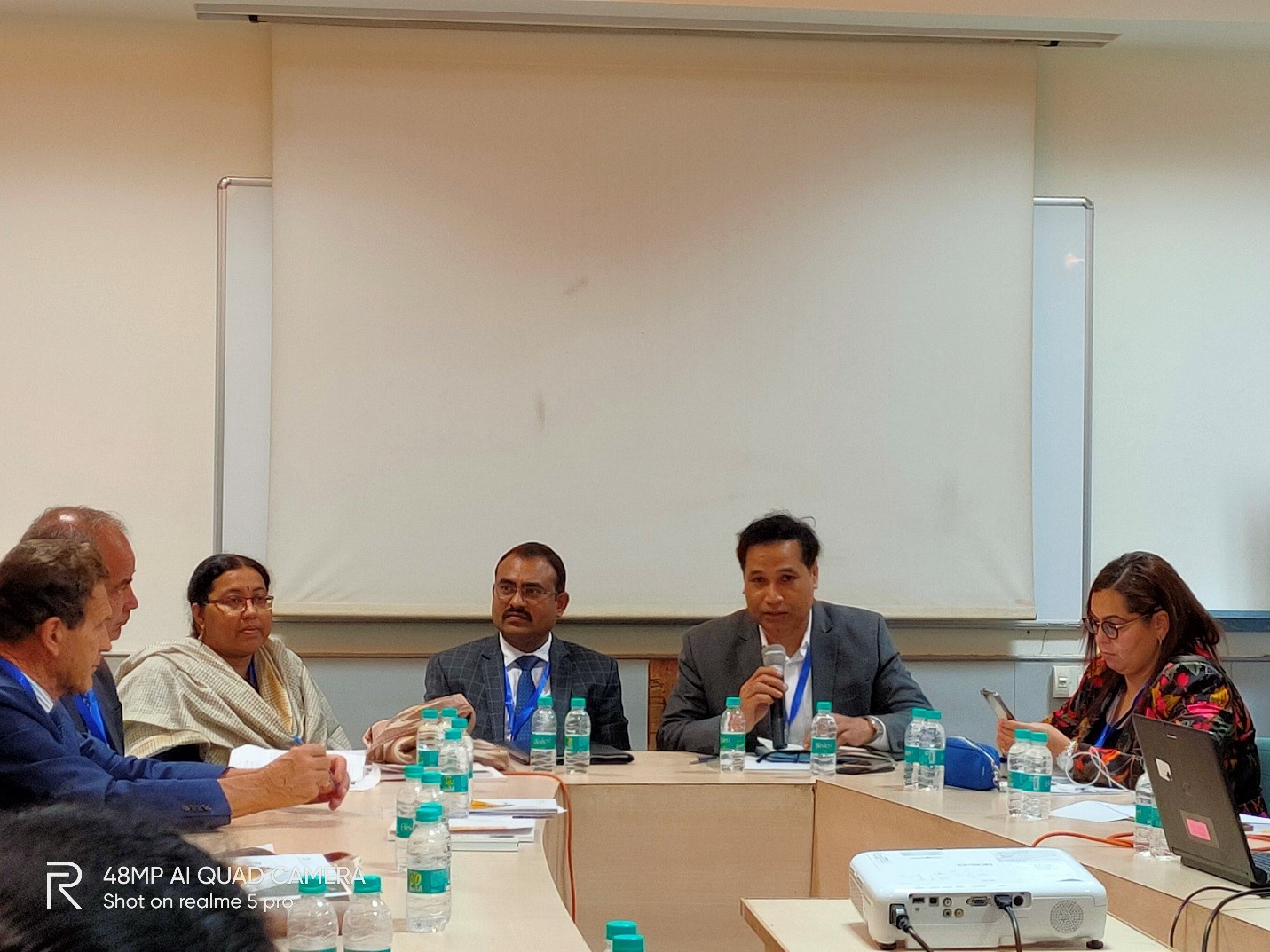
Figure 1. Introductions
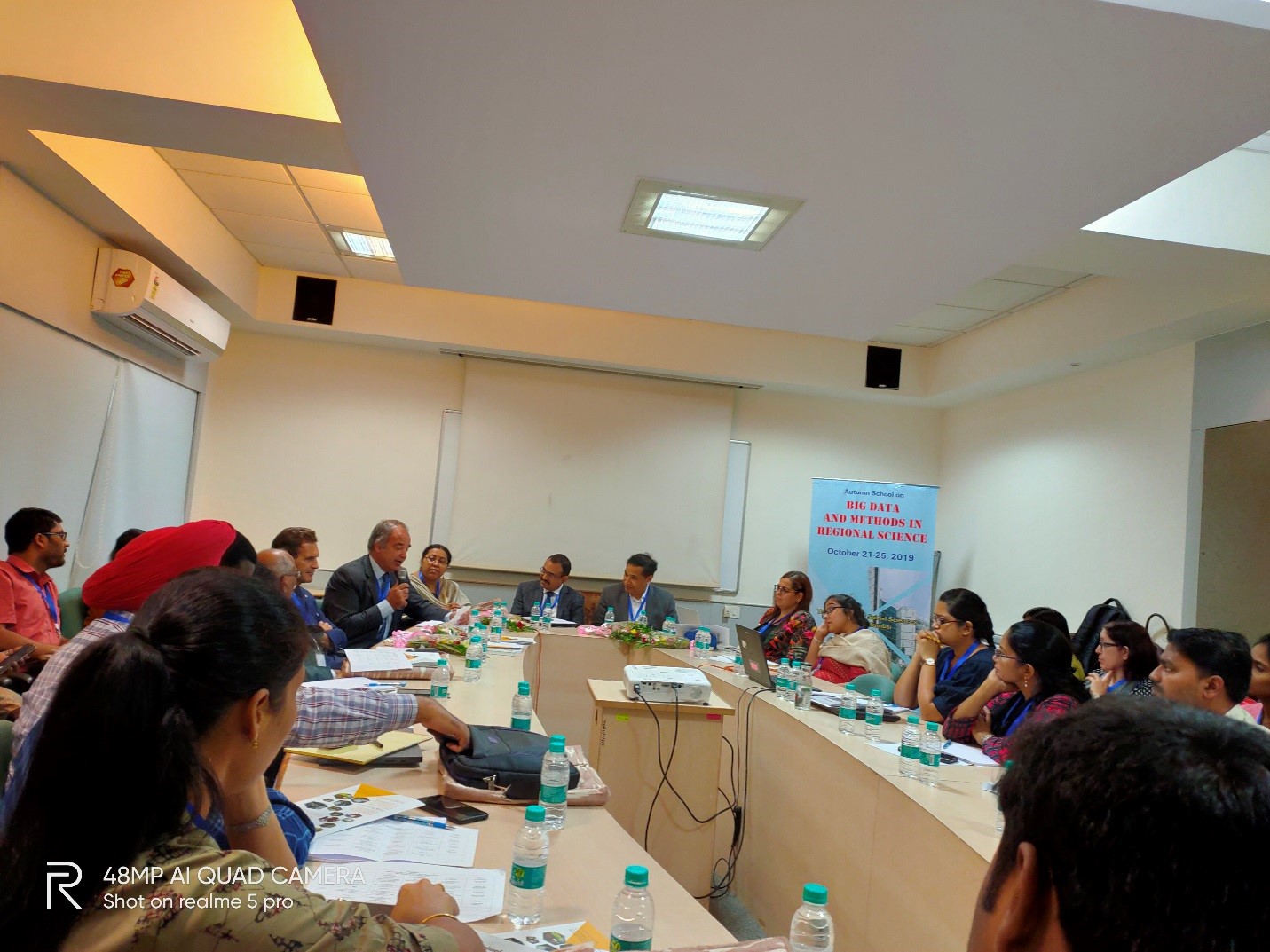
Figure 2. Opening address by Tomaz Dentinho
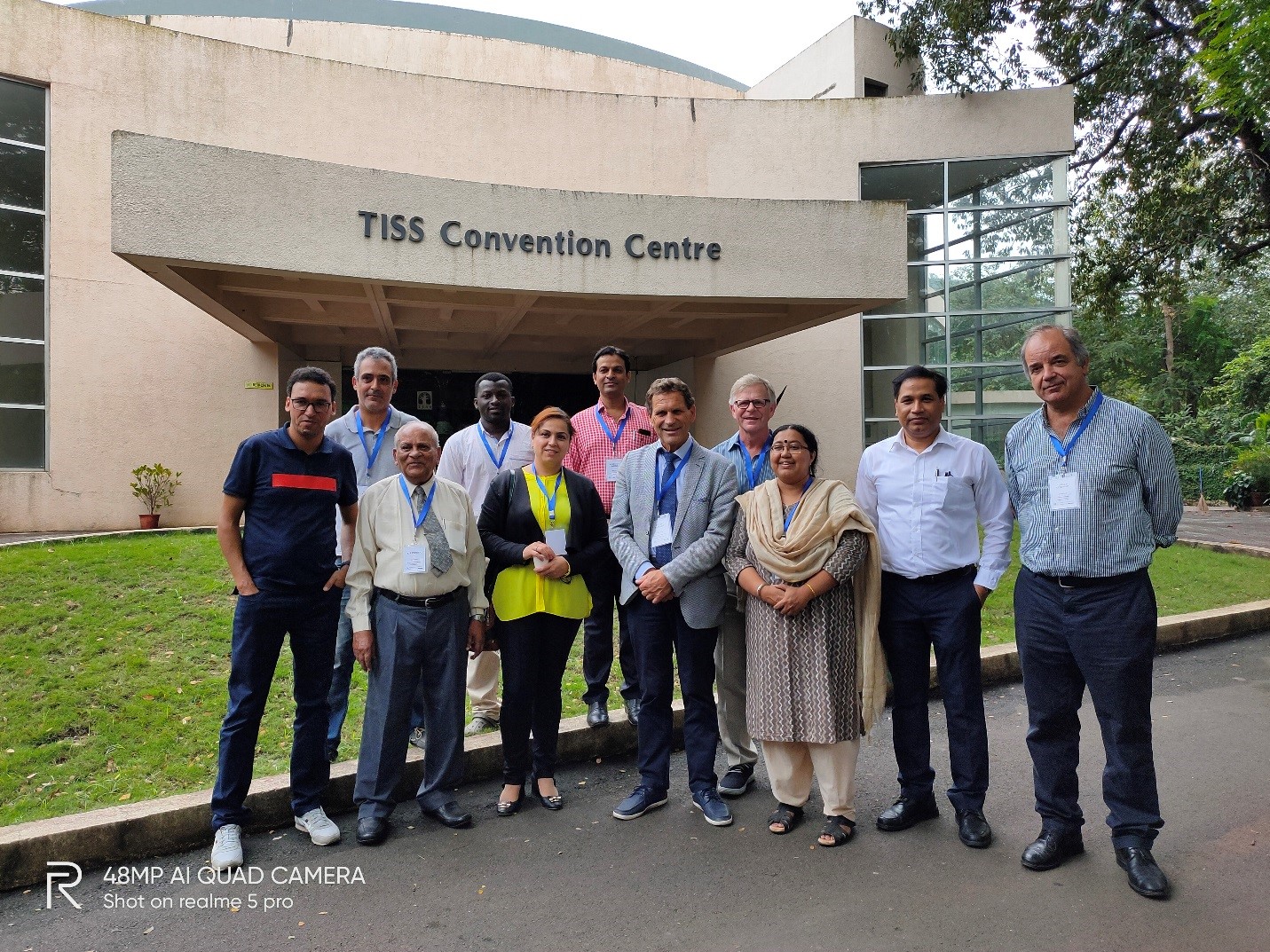
Figure 3. Speakers and organizers
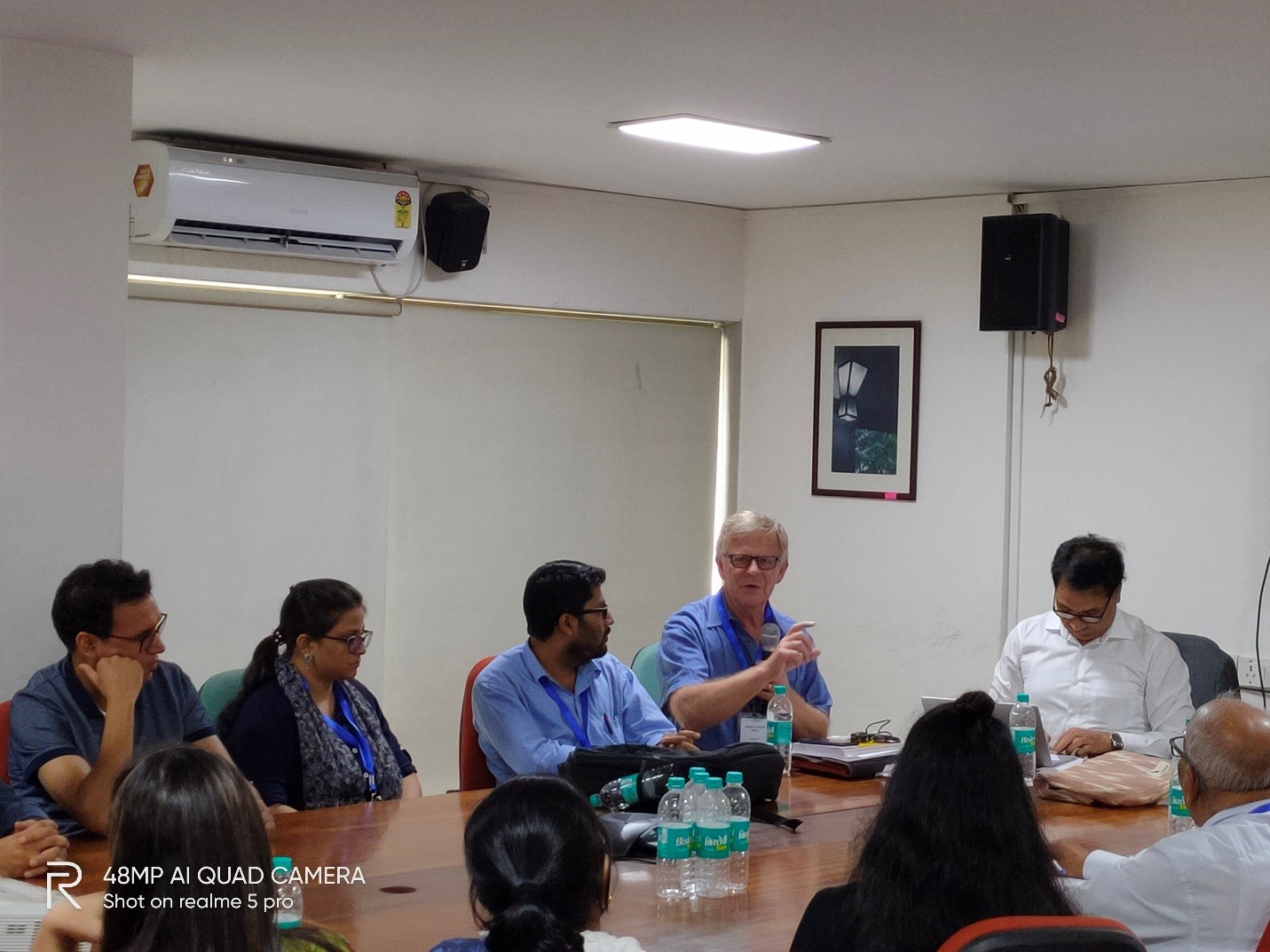
Figure 4. Closing session by Jean –Claude Thill
The Annals of Regional Science, Vol. 63, Issue 2 - New Issue Alert
|
|||||
|
|||||
|
Important news |
|||||
|
|||||
|
In this issue |
|||||
|
|||||
|
|||||
|
|||||
|
|||||
|
|||||
|
|||||
|
|||||
|
|||||
|
|||||
|
|||||
|
|||||
|
|||||
|
|||||
|
|||||
|
James LeSage
I grew up in Toledo, Ohio and attended the University of Toledo (UT) which was located a few miles from where my parents lived. I majored in economics and after completing an MA degree in 1977, I spent a year teaching as an instructor at Bowling Green State University (BGSU). While teaching at BGSU, I lived in an older mansion in Toledo that had been converted to an apartment house and I met my future wife Mary Ellen who lived in the same apartment house. We moved to Boston in 1978 where I began work on a PhD in economics at Boston College, with fields in econometrics and industrial organization.
While working on my dissertation, Mary Ellen received a job offer to teach art in Toledo, so we moved back. I ran into a faculty colleague from BGSU while shopping who said BGSU was looking to hire an econometrician, so I applied and landed the job. My work on time-series econometrics led me to discover the wealth of regional labor market data, and a BGSU colleague, J. David Reed, introduced me to regional science which was a nice outlet for applied econometrics research based on regional data. I attended the Mid-continent Regional Science Association meetings in 1986 and 1987 with David Reed, and we co-authored work that was published in Journal of Regional Science, Regional Science & Urban Economics and International Regional Science Review. Around the same time a former professor of mine from UT, Michael Magura recruited me to work on a payroll tax revenue forecasting model for the City of Toledo as well as a metropolitan area leading indicator model for the Ohio Bureau of Employment Services. Magura was also a graduate of Boston College with a specialization in industrial organization, but I convinced him that regional science was an excellent outlet for our regional labor market forecasting work. We published work in Journal of Regional Science, Growth and Change, and Regional Science Perspectives.
I attended the Southern Regional Science Association meetings for the first time in 1988 to present work with David Reed, and in this same year, Mike Magura arranged a faculty position in the economics department at UT. After a few years of daily commuting to UT from Maumee, a Toledo suburb, I convinced Mary Ellen to move to a house within a few blocks walk of my office at the university. This was no small task as we had spent six years restoring a historic house in Maumee built in 1840, that included an art studio addition. My daughter Rachel was born in 1987, making the location close to my office important for family reasons.
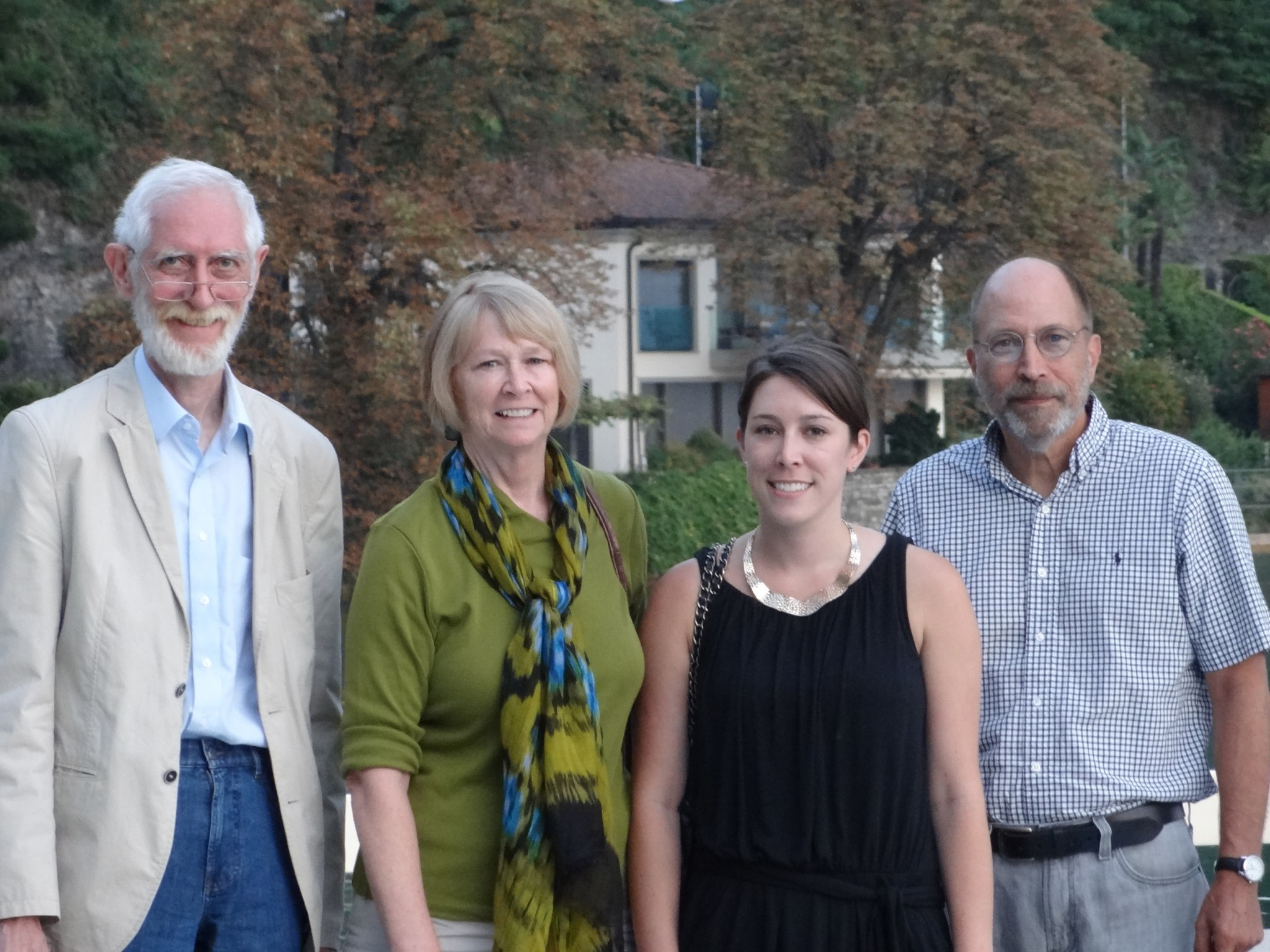
Left to right: Badi Baltagi (Distinguished Professor, Economics, Syracuse University), Jim LeSage, Kelley Pace, Paul Elhorst and Yuxue Sheng (a professor at the Business School of Guangxi University, in Nanning, China) taken at LSU, Baton Rouge.
My first attendance at the North American meetings of RSAI was in New Orleans, 1991, where I met Luc Anselin and discovered spatial econometrics. Luc’s 1988 book Spatial Econometrics: Methods and Models was very intriguing for someone trained in econometrics, as was his Cornell University dissertation which was available in the UT library. In his dissertation, Luc discussed application of Bayesian methods to spatial regression models. I was working on Bayesian time-series econometric methods at the time and Arnold Zellner assisted me in obtaining a visiting scholar position at the Minneapolis FED bank in 1993 where John Geweke helped me understand new Bayesian Markov Chain Monte Carlo (MCMC) estimation methods. John shared his FORTRAN code which helped greatly in understanding implementation of these relatively new methods first presented in a 1990 article by Alan Gelfand and Adrian Smith. I began working on spatial econometrics in 1992, but my first publication in this area was a 1997 article in International Regional Science Review on MCMC estimation of spatial regression models. Luc Anselin expressed skepticism in 1997 about MCMC estimation because it was computationally much slower than maximum likelihood estimation, but advances in computing technology over time have made MCMC estimation competitive and useful in a great number of spatial regression settings.
The Spatial Econometrics Toolbox
By 1998, I was using MATLAB software for teaching econometrics and used a Sun Microsystems workstation in my office to provide a web site for students to download code and data. The website was publicly accessible, but I did not think anyone but my students would be interested in visiting the site. One day I received an e-mail asking questions about my MATLAB code from someone outside the US, which prompted me to think about the issue of having the code publicly available for a few minutes. Thinking about the generosity of others who shared their code and ideas with me over the years, and Luc Anselin’s early attempts to provide spatial regression software, I decided to make my code freely available, which gave rise to the Spatial Econometrics Toolbox. The number of toolbox functions increased over time and the volume of downloads required moving to a professional web hosting service. Paying for a hosting service to give away free code may not seem rational from an economic perspective but having accessible code has popularized the use of spatial regression methods in applied regional science work and increased the speed of diffusion for new modeling methods. By the year 2003 the websites spatial-econometrics.com and spatial-statistics.com (with code by Kelley Pace) were generating visits from over 250 users per day with 300 megabytes of downloads. Sharing code has an added benefit of allowing interaction with practitioners doing applied work which provides valuable insights into problems encountered and the demand for new methods to tackle these problems. I am happy to see that others such as Luc Anselin, , Roger Bivand, Gianfranco Piras and Serge Rey are making spatial regression codes available. In fact, software for spatial regression modeling is now available in Stata and SAS as well as MATLAB, the R-language and GeoDA, bringing these methods into the mainstream of applied econometrics. The new Journal of Spatial Econometrics from Springer will provide a forum for theoretical issues, innovative applications of these methods, as well as discussion of software and computational issues.
Collaboration with R. Kelley Pace
Another benefit of the website was communication with Kelley Pace who generously shared MATLAB code for some of his methods that were added to the toolbox functions. I first met Kelley in person at the Santa Fe NARSC Meetings in 1998, having only communicated via e-mail prior to that. One piece of advice I would give to young scholars is to find someone to collaborate with on research as this makes things much more exciting and increases productivity. During the more than 20 years since econometric and statistical expertise such as Christine Thomas-Agnan, Harry Kelejian, Olivier Parent and Tony Smith. Technical expertise tends to be very focused, so opportunities to work and learn from others helped expand the scope of my knowledge into new realms and greatly influenced my thinking about spatial econometrics.
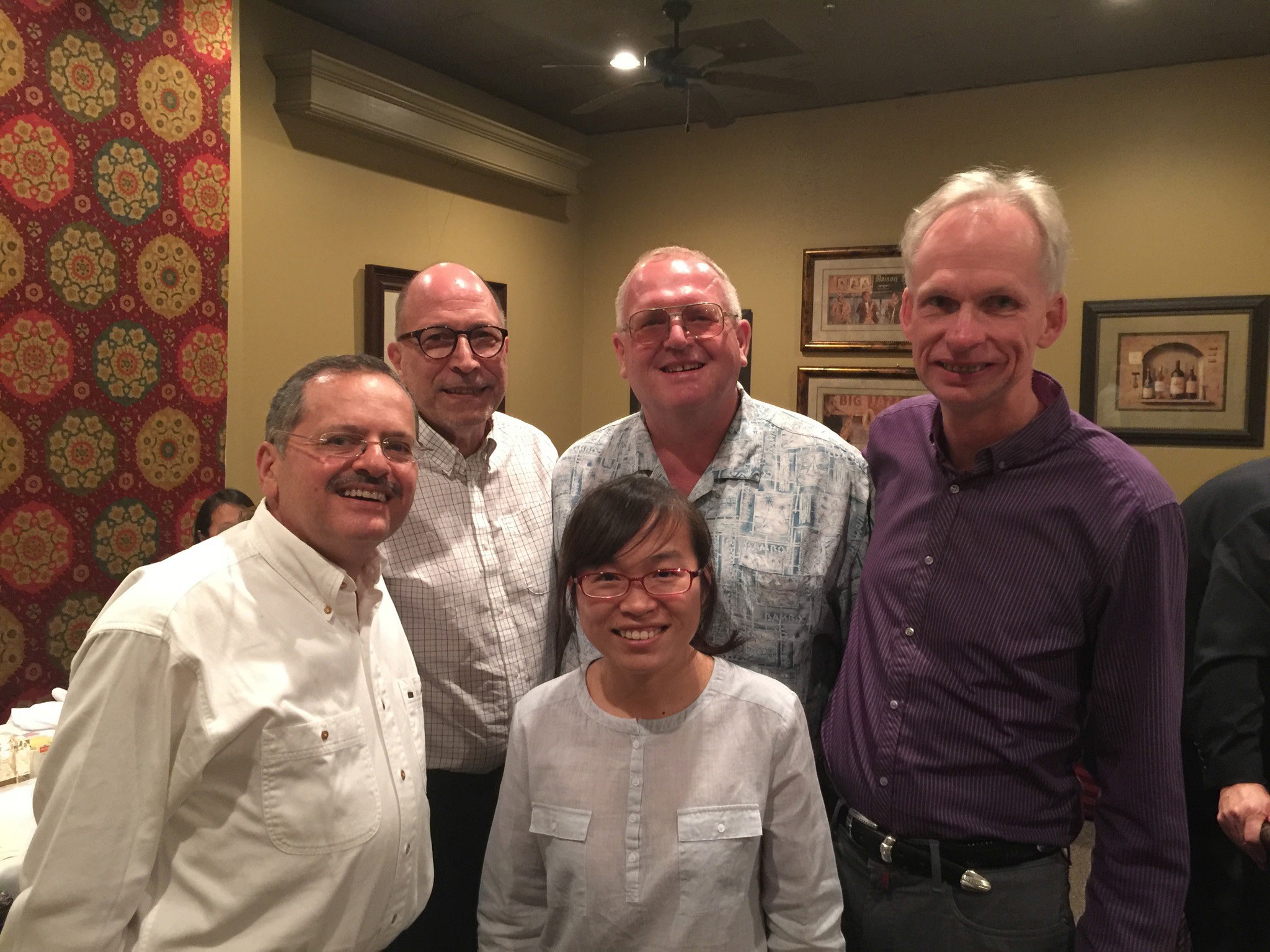
Left to right: Badi Baltagi (Distinguished Professor, Economics, Syracuse University), Jim LeSage, Kelley Pace, Paul Elhorst and Yuxue Sheng (a professor at the Business School of Guangxi University, in Nanning, China) taken at LSU, Baton Rouge.
Participation in RSAI
It would be wrong to leave this account without saying something about my involvement with RSAI activities over the years. It is my view that during my career the discipline of econometrics has become increasingly focused on theoretical and frequently esoteric issues that pay less and less attention to problems confronted by practitioners attempting to use these methods to tackle applied problems. Ultimately, econometricians need practitioners who are interested in applying our methods, and we should make it easy to use our methods by providing code and documentation, applied examples, workshops and helpful advice. Regional scientists have been a wonderful audience for spatial econometric methods and rapid adopters of new methods. In fact, the need for new modeling methods in applied regional science practice probably exceeds the ability of econometrics researchers to provide new approaches required to tackle many important problems. I frequently receive requests for code to implement a spatial regression variant of some established non-spatial econometric estimation procedure. Practitioners do not fully appreciate the complications that arise in extending non-spatial estimation to address spatial dependence, especially in the case of spatial lag models. I would encourage young scholars with econometrics expertise to turn attention to work in spatial econometrics which has a large audience of practitioners interested in new methods.
After spending more than 20 years in Ohio, I received an endowed chair opportunity in Urban and Regional Economics at Texas State University. This 2006 opportunity was made possible with help from people who are leaders in regional science, like Luc Anselin, Manfred Fischer, Geoffrey Hewings, Harry Kelejian and Tony Smith. The additional resources and free time from less teaching activity that came as part of the new position allowed Kelley and I to produce our 2009 book. In looking back, I would never have imagined what a wonderful relationship with regional science would develop over the next 30 plus years when attending the Mid-continent Regional Science Association meetings in 1986 and 1987. Young scholars should appreciate the long run importance of attending scholarly meetings. For many years I self-financed trips to attend regional science meetings, but the payoff in terms of collaborators, stimulating ideas and discussions changed my life. I sincerely hope that participation in RSAI events has an equally beneficial impact on future scholars.
(Published on RSAI Newsletter 2019 November)
About Us
The Regional Science Association International (RSAI), founded in 1954, is an international community of scholars interested in the regional impacts of national or global processes of economic and social change.

